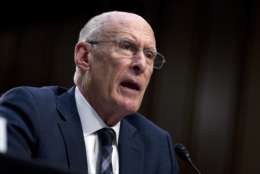security clearance
-
In today's Federal Newscast, lawmakers want to hear from the Indian Health Service's acting director about what he's done to improve on an apparent failure of the agency to provide quality health care.
March 08, 2019 -
How the heck does owning a legal stock raise questions about someone's trustworthiness?
March 06, 2019 -
In today's Federal Newscast, more time has been given for companies to come up with new ideas for the security clearance process.
March 04, 2019 -
The Air Force is using multiple programs to push back its security clearance backlog.
February 05, 2019 -
In today's Federal Newscast, the U.S. Chamber of Commerce estimates there were about $2.3 billion in government contracts that would have been issued to small firms over the past month, but weren't because of the government shutdown.
January 25, 2019 -
In today's Federal Newscast, U.S. SOCOM General Raymond Thomas III calls for a 90-day review amid a handful of ethics scandals.
December 14, 2018 -
In today's Federal Newscast, Customs and Border Protection issues Accenture a partial stop work order to pause its nearly 300 million dollar contract to hire more border patrol agents.
December 11, 2018 -
Jonathan McDonald, executive vice president of TransUnion, explains why agencies need to look to non-traditional data sources to better understand their risks.
December 04, 2018 -
The Department of Veterans Affairs said it is realigning the health administration to comply with the president's reorganization executive order.
November 26, 2018 -
In today's Federal Newscast, the Department of the Interior inspector general has referred one of their investigations into Secretary Ryan Zinke's actions to the Department of Justice for it to take over.
October 31, 2018 -
David Berteau, president and CEO of the Professional Services Council, joins host Mark Amtower on this week's Amtower Off Center for a wide ranging interview on a variety of topics, including who the PSC serves and what it does for its members. October 1, 2018
October 01, 2018 -
Would continuous background monitoring have stopped a Reality Winner from accessing, let alone leaking, secret documents?
August 24, 2018 -
The Defense Information Systems Agency used an Other Transaction Agreement to perform the work, so its scope is unclear. And at least for now, so is the winning firm's identity.
July 10, 2018 -
The backlog of security clearances in the federal government makes it harder to perform classified work, while the lack of a cyber doctrine makes it harder to respond to cyber attacks without risking escalation.
June 25, 2018 -
As the Trump administration considers moving the bulk of the governmentwide security clearance process back onto the Pentagon, the head of the National Counterintelligence and Security Center (NCSC) says his agency has a plan to cut the growing security clearance backlog.
May 15, 2018














